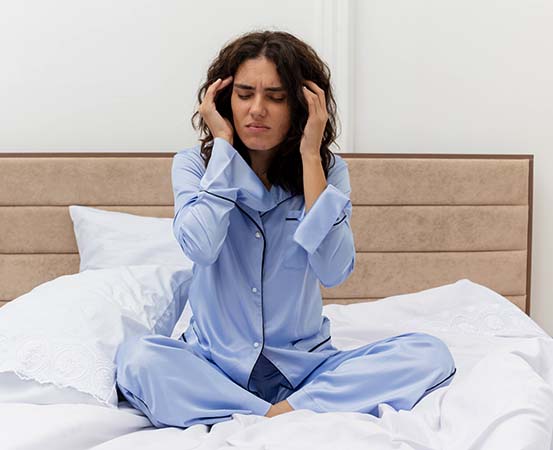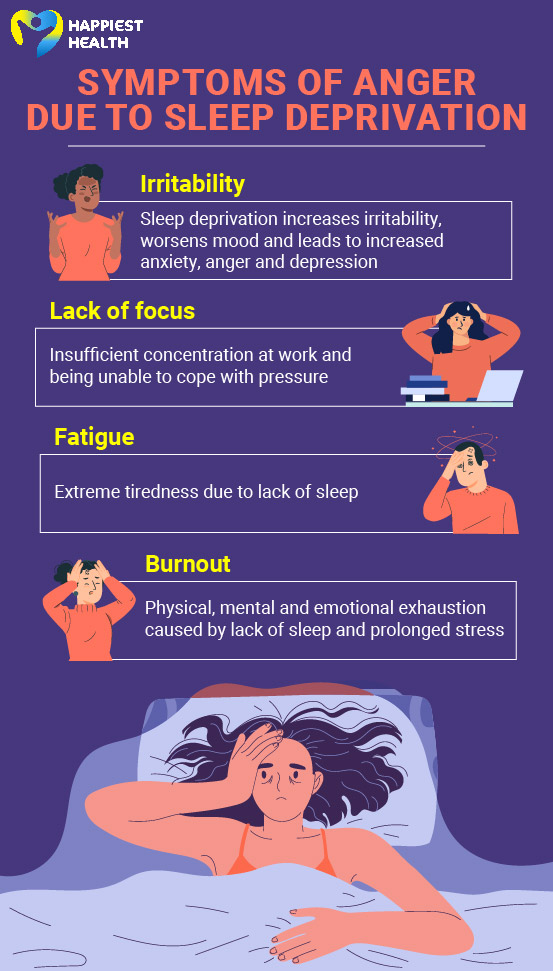
What happens when you are sleep-deprived? When it happens for two or more days in a row, it can be difficult to avoid getting into a heated argument even with a slight trigger. Experts reveal that there is a direct connection between anger and sleep deprivation. According to Dr Shailesh Jha, consultant psychiatrist, Indraprastha Apollo Hospital, Delhi, “There are two types of people according to their circadian physiology: short sleepers and long sleepers. Both require a certain amount of sleep threshold to function optimally. Short sleepers require at least five to six hours, while long sleepers require eight to ten hours. When one does not meet this sleep threshold, the deficit can unfurl diverse emotional responses, ranging from irritability to outright anger.”
In a study published in Journal of Social and Personal Relationships (2023), poor sleep quality is associated with poor relationship quality due to intensified feelings of anger and issues managing the same.
Can the lack of sleep make you angry?
“When you sleep, there is increased communication between the prefrontal cortex [part of the brain that affects the behavior, personality and ability to plan] and the amygdala [control center of the brain that manages emotions]”, says Dr Nithin Kondapuram, consultant, neuropsychiatrist, Aster Prime Hospitals, Hyderabad. “Sleep deprivation weakens the effectiveness of this communication. This allows the amygdala, which is responsible for the fight or flight response, to take charge in the brain. It can lead to increased irritability and emotional imbalance,” adds Dr Kondapuram.
He also says catching up on lost sleep is the only solution for the brain to restart itself. The brain uses this time to heal, restore memory and discard unwanted thoughts and emotions. The brain also prepares itself for facing the challenges of a new day.

Managing anger issues caused by sleep deprivation
Dr Jha says that before suggesting lifestyle changes to individuals grappling with anger issues, it is essential to find the root cause. “Analyzing visible existing mental health conditions like depression, anxiety, burnout, mood changes and psychosis help in recommending management and treatment techniques to individuals,” he explains. Here are some ways to get better sleep:
Train yourself to follow a bedtime routine
Maintaining the same sleep-wake timing is the key to a healthy circadian rhythm. Dr Kondapuram says if a person goes to sleep by 11pm and wakes up at 6am consistently for over 10 days, the body gets accustomed to the same timing. So, the trick is to stick to the same. Additionally, Dr Jha also recommends early morning sunlight to keep the sleep-wake cycle intact.
Create a relaxing sleep environment
Dimmed lights and minimal lighting in the bedroom are ideal. Moreover, it’s best to avoid loud noises in the bedroom. Experts say that the bed should not be used for work-related activities or spending time on gadgets. Dr Kondapuram says this is because the brain gets confused with lights and sounds. Hence, it cannot focus on rest, leading to reduced sleep.
Address sleep latency
Sleep latency is the amount of time it takes for you to go from wakefulness to sleep. You might be stressed out and tossing and turning all night. In such cases, meditation may not be as effective as distraction. For those who wake up at night and stay up for longer than 15 minutes, Dr Jha recommends getting up from the bed while the lights are off and distracting themselves for a while, but without reaching for the phone. Walking can be one such method. This helps reset the mind and get ample rest.
Reduce procrastination
When you procrastinate on important tasks throughout the day, you are likely to be stressed, which can lead to sleep deprivation. Your body produces more adrenaline, disrupting your sleep cycle and making you irritable the next day.
Incorporate relaxation techniques
Simple relaxation techniques such as square breathing, a controlled breathing technique that involves breathing in, holding the breath, exhaling and holding again before inhaling, with each step being repeated for five seconds, can help you calm down and induce good sleep. One can also follow a cool-down routine and neck exercises to help reduce muscle tension and improve sleep.
Dr Kondapuram recommends drinking warm milk before going to bed. “This helps in the secretion of melatonin, which increases the chances of good sleep.”
Takeaways
- If you have poor sleep quality or you are sleep deprived, you could be irritable and increasingly prone to burnout and communication challenges.
- It is important to know the cause of anger and irritability. These could stem from sleep deprivation or underlying mental health conditions.
- Practices such as following good sleep hygiene, making suitable lifestyle changes and reducing procrastination can help in improving sleep quality.
- Relaxation techniques like square breathing, cool-down routines and neck exercises can help improve sleep quality.

















